English : Unit 6 : Prose : The Last Lesson
Glossary
chirping (v) – making a short, sharp highpitched sound (usually by small. birds or insects)
bustle (v) – move in an energetic manner
unison (n) – simultaneous utterance ofwords
rapping (v) – striking with a series ofrapid audible blows
thumbed (v) – a book which has been readoften and bearing the marks of frequent handling
cranky (adj.) – strange
Saar – a river in northeastern France andwestern Germany
Angelus (n) – a Roman Catholic devotioncommemorating the Incarnation of Jesus and including the Hail Mary, said at morning, noon, and sunset.
“Vive la France!” – is an expression usedin French to show patriotism. It›s difficult to translate the term literally into English, but it generally means “Long live France!”
While reading questions:
a. What kind of news was usually put up on the bulletin board?
All the bad news such as the lost battles, the draft and the orders of the commanding officer were usually put up on the bulletin board.
b. What was the usual scene when school began everyday?
When school began everyday, there was a great bustle. It could be heard out in the street. There were the opening and closing of desks, lessons repeated in unison, and the teacher’s great ruler rapping on the table. These were the usual scene.
c. Other than the students, who were present in the class?
The village people, old Hauser, the former mayor, the former post master, and several others were present in the class.
d. Why did Mr. Hamel say it was the last French lesson?
The order has come from Berlin to teach only German in the schools of Alsace and Lorraine. Since the new master would come the next day, Mr. Hamel said that it was the last French lesson.
e. What was Franz asked to tell? Was he able to answer?
Franz was asked to recite the rules of participles. No, he was not able to answer.
1. Why did Mr. Hamel blame himself?
Mr.Hamel asked Franz to water his flowers. He gave Franz holiday when he wanted to go for fishing. Hence he blamed himself. And so he could not study French properly.
g. What did M. Hamel say about the French language?
Mr. Hamel said that the French language was the most beautiful language in the world. According to him, it was the clearest and the most logical language.
h. How many years had M. Hamel been in the village?
M. Hamel had been in the village for forty years.
A. Answer the following questions in two or three sentences:
1. Why did Franz dread to go to school that day?
Franz’s teacher M.Hamel told him that he was going to ask questions on participles. But Franz did not know the first word about participles. So he dreaded to go to school that day.
2. What were the various things that tempted Franz to spend his day outdoors?
Warm and bright outdoors, chirping of the birds at the edge of the woods, and the drilling of the Prussian soldiers in the open field at the back of the saw mill were the various things that tempted Franz to spend his day outdoors.
3. Why was the narrator not able to get to his desk without being seen?
Class had already begun. His classmates were in their places and M.Hamel was walking up and down. So the narrator was not able to get to his desk without being seen.
4. What was Frank sorry for?
Franz was sorry for not learning his lessons.
5. Why were the old villagers sitting in the last desk?
The old villagers were sitting in the last desk to honour and thank M.Hamel’s forty years of faithful service and showing their respect for the country.
6. What were the thoughts of the narrator’s parents?
The narrator’s parents preferred him to work on a farm or at the mill so as to have a little more money.
7. Why does M. Hamel say that we must guard our language?
When people are enslaved, as long as they hold their language, it is as if they had the key to their prison. M. Hamel says that we must guard our language.
8. M. Hamel was gazing at many things. What were they?
M. Hamel was gazing at everything in that little school room.
9. When and how did M. Hamel bid farewell to the class?
When the Church clock struck 12, M.Hamel bid farewell to the class. He wrote “Vive La France” on blockboard and told the students that the school dismissed and let them go.
B. Answer the following questions in about 100-150 words:
1. We appreciate the value of something only when we are about to lose it. Explain this with reference to the French language and M.Hamel.
Lesson : The Last Lesson
Author : Alphonse Daudet
Theme : Importance of mother tongue – condition of France after the Franco-Prussian war.
Characters : M.Hamel, Franz, Village people
Outlook : Mother tongue – important – people – attend the class – M.Hamel – taught – last lesson
Two districts of France, Alsace and Lorraine were taken over by the Prussians during Franco-Prussian war. The people were compelled to leam German instead of French. When they knew, French will no longer be taught to them, they realized its importance. Suddenly they developed an inclination towards learning French. The students, the village people, old Hauser, the former mayor, the former post master, and several others were present in the class. They wanted to attend the last French lesson. They eagerly brought their old form primers to leam the language. The French teacher M.Hamel said that the French language was the most beautiful, clearest and logical language in the world. He advised them to guard their language. He explained the lesson with all patience. The whole class keenly learned their last French lesson. Thus they appreciate the value of their language, only when they are about to lose it. With this reference we can understand that we appreciate the value of something only when we are about to lose it.
ESSAY
• Introduction
• Late realisation
• The last lesson
• Importance of French
• Conclusion
Introduction
In this lesson ‘The Last Lesson’ the author clearly depicts the condition of France after the Franco-Prussian war. Two districts of France, Alsace and Lorraine were taken over by the Prussians. The French were compelled to learn German language.
Late realisation:
When they knew French will no longer be taught to them, then only they realized its importance. Suddenly they developed an inclination towards learning.
The last lesson:
The students, the village people, old Hauser, the former mayor, the former post master, and several others were present in the class. They wanted to attend the last French lesson. They eagerly brought their old form primers to learn the language.
Importance of French:
The French teacher M.Hamel said that the French language was the most beautiful, clearest and logical language in the world. He advised them to guard their language. He explained the lesson with all patience. The whole class keenly learnt their last French lesson.
Conclusion:
Thus they appreciate the value of their language, only when they are about to lose it. With this reference we can understand that we appreciate the value of something only when we are about to lose it.
Moral: if you are late you may lose some valubles
2. Give an account of the last day of M.Hamel in school.
Lesson : The Last Lesson
Author : Alphonse Daudet
Theme : M.Hamel’s class – Importance of mother tongue – condition of France after the Franco- Prussian war.
Characters : M.Hamel, Franz, Village people
Outlook : M.Hamel – best dress – Quiet classroom – villagers – last lesson – not scold Franz – could not speak – long live France.
The French teacher M.Hamel was dressed in his Sunday’s best. Instead of noisy classroom everything was as quiet as Sunday morning. The village people, old Hauser, the former mayor, the former post master, and several others were present in the class. They gathered there in order to honour and thank M.Hamel’s forty years faithful service and of showing their respect for the country. M.Hamel did not scold his student Franz, though he was late to the class. Franz was sorry for not learning his mother tongue properly. M.Hamel said that it was the last French lesson. M.Hamel said that the French language was the most beautiful, clearest and logical language in the world. He also said that they must guard their language. At last he overcame with his emotions, he could not speak and so wrote “Vive La France” on the black board. He told the students that the school was dismissed and let them go. Thus the last lesson brought the importance of need of mother tongue in the students and the village people through M.Hamel.
ESSAY
• Introduction
• M. Hamel and his class
• Villager’s tribute
• Franz’s realization
• Hamel’s announcement
• Hamel’s emotions
• Conclusion
Introduction
In this lesson ‘The Last Lesson’ the author clearly depicts the condition of France after the Franco-Prussian war.
M. Hamel and his class:
The French teacher M.Hamel was dressed in his Sunday best. Instead of noisy classroom everything was as quiet as Sunday morning. The village people, old Hauser, the former mayor, rbe former post master, and several others were present in the class.
Villager’sdribute:
They gathered there in order to honour and thank M.Hamel’s forty years faithful service and of showing their respect for the country.
Franz’s realization
M.Hamel did not scold his student Franz, though he was late to the class. Franz was sorry for not learning his mother tongue properly.
Hamel’s announcement
Mr. Hamel said that it was the last French lesson. Mr. Hamel said that the French language was the most beautiful, clearest and logical language in the world. He also said that they must guard their language.
Hamel’s emotions
At last he overcame with emotions could not speak and wrote “Vive La France” on the black board. He told them that the school was dismissed and let them go.
Conclusion:
The Last lesson brought the importance of need of mother tongue in the students and the village people through M.Hamel.
Moral: Never give up your mother tongue, Never lose your identity.
Vocabulary
C. In column A are some of the idiomatic phrases from the essay. Match them with equivalent single words in column B:
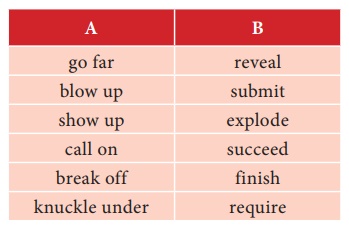
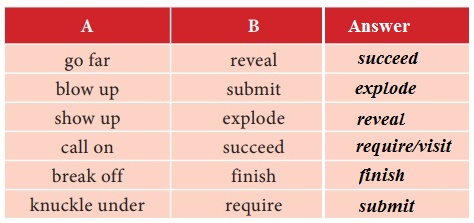
D. Frame sentences of your own using the above idiomatic phrases.
go far : Every one was sure he would go far.
blow up : The car blew up as soon as it hit the wall.
show up : I invited him for 8 o’ clock but he didn’t show up until 9.30.
call on : We are able to call on academic staff with a wide variety of expertise. He’s planning to call on Catherine today.
break off : He started speaking and broke off in the middle of the sentence
knuckle under : He won’t knuckle under to their demands
E. Given below are some idiomatic phrases. Find the meaning of it using the dictionary:
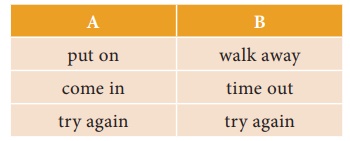
put on : wear
come in : enter
try again : repeat
walk away : go
time out : rest
try again : attempt
Listening
F. Listen to the article titled “Remembering Nel Jayaraman”
In pairs, present an interview. One student will be the interviewer and the other would be Nel Jayaraman himself. Two sets of conversations has been given as examples for your help.
Student A : (interviewer) – Vanakkam sir. For what cause do you organise festivals ?
Student B : ( NJ) – I organise these festivals with a difference. I present seeds to all the participating farmers.
Student A : (interviewer) – Oh ! That’s really good, Sir. What do you expect in return ?
Student B : ( NJ) – In return I expect them to have double the harvest next year.
Student A : (interviewer) – Where did you organise the NEL festival ?
Student B : ( NJ) – We organize the NEL festival at Adhirangam Village in Thiruvarur
Student A : (interviewer) – Can you mention how many people congregated for the meeting ?
Student B : (NJ) – Nearly 5000 people congregated for the meeting.
Student A : (interviewer) – What did you distribute to the farmers?
Student B : (NJ) – I distributed traditional Paddy seeds to the farmers.
Student A : (interviewer) – How did you commute to each these villages?
Student B : (NJ) – I used my cycle or take a bus to commute to to those Villages .
Student A : (interviewer) – Ayya, Do you plan your schedules ?
Student B : ( NJ) – No, I don’t plan my schedules.
.Student A : (interviewer) – How could you remain so cool an clam sir ?
Student B : ( NJ) – I have an alternative solution for all the problems..
Student A : (interviewer) – Where was your heart and soul ?
Student B : (NJ) – My heart and soul was always in the fields and seeds.
Student A : (interviewer) – People say when your popularity grew, you spent less time in the field ?
Student B : (NJ) – I have spent my entire life in the fields only. I never care for any negative comments.
Student A : (interviewer) – What is your message to the world ?
Student B : ( NJ) – If you work selflessly for the society, it will give back.
Student A : (interviewer) – Thank you, Sir. Nandri
Student B : (NJ) – Nandri.
Speaking
Giving directions is sometimes not an easy job. Here is an example of how to give directions.
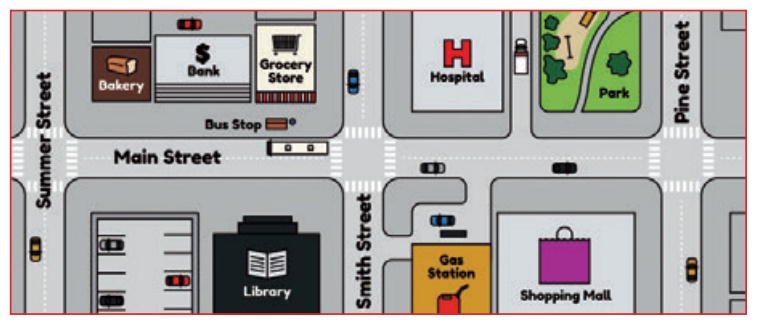
Instructions
You are waiting for your friend Raja at the shopping mall. He will get down from the bus at the bus stop in Main street. Give him directions to reach the mall.
After you get down, walk forward along the main street and cross smith street at the zebra crossing. You can see a hospital to your left. Walk straight and you can see the park to your left. Cross the road at the second zebra crossing to reach the shopping mall opposite the park. I will be waiting at the entrance.
G. A road map is given below. Answer the questions that follow with the help of the road map. Work in pairs and discuss to give directions to get to one place from another.
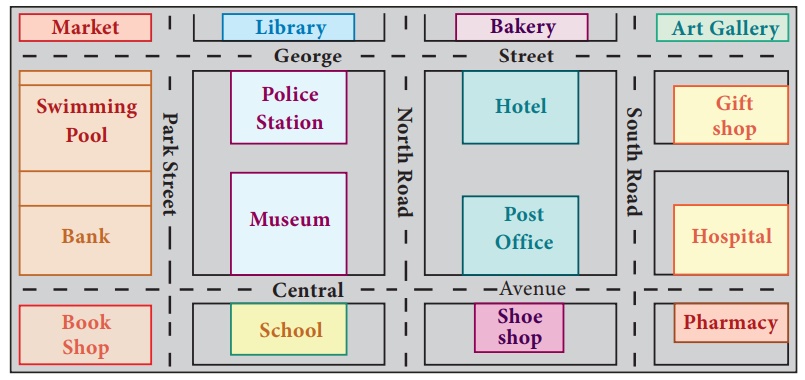
1. You are at the market. You need directions to go the pharmacy.
• Step down the road and turn left
• Walk along the George Street
• Skip the swimming pool and turn right
• Enter the Park Street and walk
• Skip the bank and turn left
• Enter the Control Avenue and walk
• Skip the school and shoe shop
• Find the pharmacy on your right hand side opposite the hospital.
2. You are in a book shop. Ask your partner to direct you to the Art Gallery.
• Step down the road and turn right
• Walk along the central avenue
• Skip the school and the shoe shop and turn left
• Enter the South Road and walk
• Skip the hospital and the gift shop in the South Road
• Reach George Street and turn right.
• You can find the art gallery opposite the shop.
3. Give your partner the directions to go from the Bank to the hotel.
• Step down the road and turn left
• Walk along the park street
• Reach George Street and turn right
• Walk along the George Street
• Skip the police station on your right
• Find the hotel on your right hand side next to the police station
4. Direct your partner from the post office to the market.
• Step down the road and turn right
• Walk along the Central Avenue
• Skip the museum and turn right
• Enter the park street and walk
• Skip the bank and the swimming pool
• Enter the George Street and Turn left
• Walk along George street
• Find the market on your right hand side
5. Your partner wants to go the library from school. Give suitable directions.
• Step down the road and turn right
• Walk along the central avenue
• Enter into the North Road and Turn left
• Walk along the north road
• Reach the George street
• Turn left
• Find the library on your right hand side
Reading
H. Read the poem carefully and answer the questions that follow:
Festival of harvest
Celebrations at its best
Festival of Light
To our heart’s delight
Festival of Dance
Leaves us in a trance
Festival of Music
Where they sing the joyous lyric Festival of flowers
That brightens up with colours
Festival of decorated cars
That twinkle like the stars
Festival of Love
That spreads treasures on a tree,
To share the word from above
That makes us happy and free.
Festival of sacrifice
To unfurl the joy of giving,
Celebrate them well and nice
To make life worth living.
Fill in the blanks.
1. (a) festival of Light is the festival which fills our hearts with delight.
(b) The joy of giving is referred to as a festival of sacrifice.
2. What kind of joy is unfurled during the festival of sacrifice?
The Joy of giving is unfurled during the festival of sacrifice.
3. How can we make our life worth living?
We can celebrate the festivals well and nice and make our life worth living.
4. What does the poet mean by ‘Festival of flowers’?
Since it is decorated with colourful flowers, it is called as festival of flowers.
5. When are we in a state of trance?
We are in a state of trance, during festival of dance.
6. What do the people do when the festival of Music is celebrated?
The people sing the joyous lyric, when the festival of music is celebrated.
7. What makes us happy and free, according to the poet?
According to the poet, festival of love makes us happy and free.
8. Find out the rhyme scheme employed in the fourth stanza.
a b a b
9. Pick out the rhyming words from the first stanza of the poem.
harvest-best, light-delight, dance-trance, music – lyric, flowers- colours
10. Write down the words that alliterate in the poetic lines below.
(a) Festival of Flowers – Festival Flowers (Sound is alliterated)
(b) That spreads treasures on a tree – Treasures, tree (T sound is alliterate)
Writing
Posters
What is a poster?
Posters are placards displayed in a public place announcing or advertising something. Posters are notices, advertisements and invitations – all in one.
What is the purpose of a Poster?
It is to create social awareness about current problems and needs, or to advertise or invite and display something.
Layout of a poster
· It should be attractive, colourful and tempting
· The title should be catchy
· Slogans or jingles should be used
· Sketches or simple drawings may be used
· Letters may be of different sizes and shapes
· Proper spacing should be given
Content of a poster
· The theme or subject
· Descriptions along with it
· Essentials like time, date, venue etc. to be given, in case of an event
· Names of issuing authority/ organisation to be given
Expression of Poster
· Slogans/ phrases can be used
· Sequencing to be correct
· Creativity to be appreciated
Example 1 : You are Vikram/ Vikasini. Design a poster in not more than 50 words for your school library to highlight the value of books and reading habits. You may use good slogans/ phrases.

Example 2 : You are Ajay/ Aruna. You are contesting for the post of the School Pupil Leader of the Student Council of your school. Design a poster in not more than 50 words to impress your friends as to why they should vote for you. You may use good slogans/ phrases.
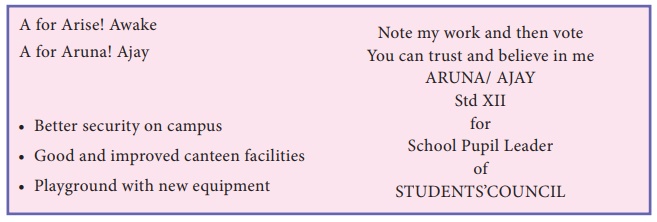
I. Create posters for following
1. You are Raja/ Ranjani. Draft a poster to create awareness about the harmful effects of using plastics, in not more than 50 words

2. Say ‘No to Drugs’ – Design a poster for it in not more than 50 words. You may use slogans/ phrases.

3. “Save our Earth” is the need of the hour. Draft a poster with attractive slogans/ phrases for the same in not more than 50 words. Use attractive drawings.

4. You are Sita/ Sudhan. Design a poster in not more than 50 words to focus on not wasting water. Be creative.

5. Good handwriting is the index of an individual. Design a poster on the importance of good handwriting. Use catchy slogans or phrases. Your poster should not exceed 50 words.
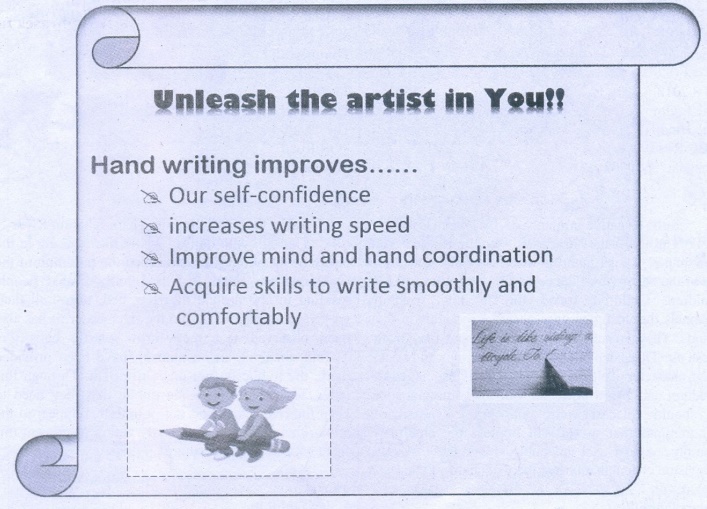
Letter To Editor
This is a formal type of letter
The format is as follows:
❖ Sender’s address
❖ Date
❖ Receiver’s address Salutation
Sir / Madam
❖ Subject
Subscriptions Yours faithfully Signature Designation
Main body of the letter
❖ Introductory paragraph – stating the problem
❖ 2nd paragraph – stating the causes of the problem (at least two)
❖ 3rd paragraph – stating the effects (at least two)
❖ 4th paragraph – suggestions or remedial measures (at least two)
❖ Concluding paragraph – the benefits and need for resolving the problem (each paragraph can be of just two or three sentences)
Some useful expressions
❖ Through the esteemed columns of your daily/ newspaper, I wish to bring to your kind notice ____
❖ In my opinion
❖ This is a very shocking/ disturbing use of ____
Example:
You are Raja. You are upset about the bad influence of TV channels on the young children. You decide to write a letter to the editor of a leading newspaper suggesting measures to upgrade the standard. Write this formal letter in about 100-120 words
2, Sundar Court
Egmore
Chennai
23.8.2018
The Editor
The Hindu
ABC Road
Chennai – 600002
Sir
Sub. : Negative influence of TV channels
Through the esteemed columns of your newspaper, I wish to bring about a public awareness on the negative influence of TV channels on young children.
Children spend the evening watching channels that instigate only negative thoughts in their minds.
They are unwilling to go out and play in the fresh air. These depictions spoil their minds and negate their character.
Television is an effective social media and also a powerful tool for communication; it should telecast more and more value based programmes that would impress the children.
I humbly request you to publish this letter so that television channels improve their standard of telecast.
Thank you
Yours faithfully
Raja
Example 2:
You are Gomathi, a resident of a colony adjacent to the Thamirabarani River. Daily you see many people throwing waste into it, spoiling the pure water. Write a letter to a newspaper showing your concern about it and also voicing your worry. Give your suggestion to solve this problem.
1, Salai Street
Selvi Nagar
Thirunelveli
23.8.18
The Editor
The Thanthi
PQR Road
Thirunelveli
Sir
Sub. : Stop polluting the Thamirabarani River
Through your daily, I would like to bring to the notice of the authorities concerned the pollution of the Thamirabarani river.
It is sad to note that people residing in and around the river bed, throw all their waste or dump garbage into the river water. It has also been observed that they throw plastic bags too.
Though dustbins and containers have been provided there, the public do not make use of it.
Through this letter, let me appeal to the public that they need to keep the river clean and not pollute it. I appeal to the authorities to take the necessary action to prevent this from happening in the future.
Thank you
Yours faithfully
Gomathi
J. Draft Letters for the following
1. You are Ajeet, living in a remote village in Tirunelveli. You participated in a health camp organised by your school. You were surprised to observe that most of the residents were unaware of health and hygiene. As a concerned citizen, write a letter to the editor stating the need to organise such camps focusing on the importance of health and hygiene.
Ajeet,
123, Sree Nagar,
Perur.
Tirunelveli.
23.8.2018
The Editor
The Hindu
ABC Road
Tirunelveli-627001.
Sir,
Sub: Awareness about the Importance of health and hygiene.
I am Ajeet, living in Perur village in Tirunelveli. I have participated in a health camp organized by my school. I was shocked to observe that most of the residents were unaware of heulih and hygiene near our village.
Generally, these people don’t use toilets here. They use open areas. It leads to the spread of major diseases. They don’t know how to wash hands. They are not aware of personal hygiene. There is a great need to organise such camps focussing on the importance of health and hygiene in these areas. The authorities should conduct awareness programmes like Street plays, meetings and short films on personal and public hygiene. Government should use mass media for this cause.
Since a nation’s power mainly relies on its human power, it is the Government’s duty to keep its every citizen healthy and strong.
Thank you
Yours faithfully
Ajeet
2. You are Sanjay. Your colony utilises solar energy to light the common areas. You find many friends of your colony forgetting to switch off the lights in the common area. As a responsible citizen, write a letter to a newspaper, echoing the importance to conserve and preserve solar energy.
Sanjay,
Paramasivapuram
Lalgudi
23.8.18
The Editor
The Times of India
Trichy-620002.
Sir,
Sub: Importance of conserving and preserving solar energy.
Through your daily, I like to “bring to the notice of the persons who misuse solar energy & the importance to conserve and preserve it.
I am Sanjay. Our colony utilises solar energy to light the common areas. But Many friends of our colony are forget to switch off the lights in the common area in the morning. Unnecessarily we waste the solar energy. We assign a team of volunteers to tackle this issue.
Now-a-days most of the people want to instal solar panels at their home. Installing solar panels in your home is a great way to lower the electricity bill even negate electricity bills can be enjoyed in solar home. But we should also conserve that energy. Here I have some energy saving tips for solar homes.
• Unplug your appliances when not in use.
• Use energy efficient appliances.
• Use LED light bulbs.
• Insulate your home properly.
• Plant shrubs and trees nearby.
• Reduce daytime energy use.
As a responsible citizen, every one should take steps to conserve and preserve solar energy.
Thank you
Yours faithfully
Sanjay
3. You are Sadasivam. You recently visited your native town in Vellore. You happened to accompany your grandmother to your family temple. You were shocked to notice the poor condition and maintenance of the temple. Write a letter to the Editor of local newspaper highlighting the poor condition of the temple. Also give some suggestions and request the HRC to take steps to improve the situation.
Note: HRC – HR & CE – hindu religious and charitable endowments
Sadasivam,
123, Kamarajar nagar
Kancheepuram
23.8.2018
The Editor
The New Indian Express
ABC road
Vellore-632001.
Sir,
Sub: Poor condition of the temple.
Through your daily, 1 like to bring to the notice of the authorities concerned the poor condition of the temples in Vellore.
I am Sadasivam. I have recently visited the XYZ temple in Vellore. I was shocked to notice the poor condition and maintenance of the temple. The walls and pillars of the temple are damaged. People spit beetle juices here and there.
There is no proper light facilities..No one takes care ot it. People are throwing waste in and around the temple. The sculptures are not well maintained.. The tourists hesitate to enter the temple.
HR and CE department should take necessary steps to renovate the damaged parts of the temple. There must be fencing around the temple. Steps like installation of CCTV cameras, putting guards on duty to maintain proper cleanliness should be taken.
I request you to publish this news through the columns of your esteemed daily. I also appeal to the HR and CE to look into the problem and do the needful.
Thank you
Yours faithfully
Sadasivam
4. You are Sudha. Your neighbour has a pet dog that barks continuously. Write a letter to the Editor of a weekly newspaper of your locality, highlighting the nuisance and noise pollution created thus. Also suggest ways to solve the problem.
Sudha,
ABC road
Coimbatore
23.8.2018
The Editor
CBE News
ABC road
Coimbatore-641001.
Sir,
Sub: Nuisance caused by a pet dog.
Through the esteemed columns of your weekly newspaper,. I wish to bring about the noise pollution and the negative influences of it in our area.
I am Sudha. My neighbour has a pet dog that barks continuously. It causes a great nuisance not only to us but also the people who walk along the road. It barks continuously at the people walking in the street. Noone could sleep peacefully. The students are not able to study their lessons. The noise pollution disturbs the patients in our locality. They suffer a lot.
i think the dog is not properly maintained and trained by its owners. The owners of the dog should vaccinate the dog at proper intervals. They have to feed it at correct time. They should allow it to roam a few hours daily. Kindly instruct them to train their dog well. Otherwise keep their dog off from our area and reduce the noise pollution.
Thank you
Yours faithfully
Sudha.
5. You are Raja. The street lights of your area do not work properly. As a responsible citizen, write a letter to the newspaper enlightening them about the problem and also suggest ways to brighten the area.
Raja,
Dhilip street, Sathyamangalam.
23.8.2018
The Editor
The Hindu
ABC road
Vellore-632001.
Sir,
Sub: Bad condition of the street lights
Through your daily, I like to bring to the notice of the authorities concerned the bad condition of the street lights in Vellore.
I am Raja. The street lights of my area do not work properly. After it gets dark, moving on the streets is risky. People suffer a lot. Chain snatching and accidents take place every now and then. And also the other anti-social activities are increasing. I appeal to the concerned authorities in the municipal corporation to look into the matter and make the street lights functional again.
I hope you will give space to my voice in your esteemed daily.
Thank you .
Yours faithfully
Raja
Grammar
Subject – Verb Agreement
The subject and verb of a sentence should be in agreement with each other.
A verb agrees with the subject in number and person. A singular subject takes a singular verb and a plural subject takes a plural verb.
E.g. for singular verb in a sentence
1. She is a good speaker.
2. Ramu is an intelligent student.
3. Subhasini is an excellent dancer.
4. Sunita is a great artist.
5. He is a good person.
E.g. for plural verb in a sentence
1. Children are playing.
2. They have finished their work.
3. Geeta and Sita have won the prize.
4. You and I are friends.
5. Two and two make four.
Rules
1. Two or more singular subjects joined by “and” take a plural verb
E.g. You and I love music
2. When two subjects are joined by “as well as”, the verb agrees with the first subject
E.g. Her cousins as well as she are hard working
3. Either, neither, each, every and everyone are followed by a singular verb
E.g. Each of them is lovable
4. When two singular nouns refer to the same person or thing, the verb must be singular
E.g. My sister and friend has come
5. When two subjects express one idea, the verb is in the singular
E.g. Three and three make six
6. When a plural noun expresses some specific quantity or amount considered as a whole, the verb is in singular
E.g. Thirty litres of milk is too much for payasam
7. When two or more singular subjects are connected by “with”, “together with”, “and not”, “besides”, “no less than”, the verb is in singular
E.g. He and not she is to blame
8. The verb agrees with the number of the nouns that follow the verb
E.g. There are ten students in the crowd
9. Some nouns that are plural in form but singular in meaning, take a singular verb
E.g. Tamil is my mother tongue
10. A plural noun which is in the name of a country, province, a book, is followed by a singular verb
E.g.Human values is of great importance
11. A collective noun takes a singular verb
E.g. The whole class is attentive.
12. A relative pronoun must agree with its gender, number and person
E.g. It is I, who is to write
A. Fill in the blanks appropriately
1. Mahatma Gandhi is the father of our nation.
2. There are ten dogs in my street.
3. They are to write the exercises neatly.
4. Butter milk is good for health.
5. Fruits are good for health.
B. Fill in the blanks with the appropriate verb:
1. The quality of dal is not good.
2. The horse carriage is at the door.
3. My friend and teacher has come.
4. Are your father and mother at home?
5. Honour and glory is his reward.
6. The ship with its crew is sailing good.
7. Gullivers Travels is an excellent story.
8. Neither food nor water is found here.
9. Mathematics is a branch of study.
10. Fifteen minutes is allowed to read the question paper.
C. Change the singular nouns to plurals by either adding ‘s’, ‘ies’, ‘es’, ‘ves
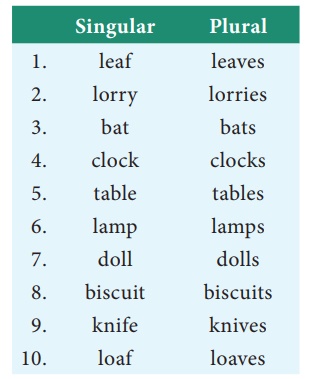
Non Finites
Verbs are action words. They are divided into two: Finite and Non Finites.
Finite Verbs ….
1. act as a verb.
2. act as a main verb of a sentence or a clause.
3. indicate number, person and tense.
4. are used in the present tense and the past tense.
5. have to agree with the subject and change accordingly.
On the other hand, Non Finite verbs
1. do not act as a verb.
2. act as nouns, adjectives and adverbs.
3. do not indicate number. person or tense.
4. are usually gerunds, infinitives or participle.
The different kinds of Non Finites are:
1. Infinitives
2. Gerund
3. Participles
Infinitives:
1. Full infinitives – It is “to+ a verb.
Example: Pushpa eats lunch with me.
{to+a verb}
‘eats’ is a third person
singular, simple present
tense, main verb.
2. Bare infinitives – It is a verb without ‘to’
Example: Reena will help me.
Gerund:
Gerund functions as a noun, so it is called a verbal noun. It also functions as an adjective.
A gerund has the same form as a present participle.
Gerunds are used in the following ways.
1. As a subject and a kind of a noun.
a) Reading is a good habit.
b) Learning a language is always useful.
2. As an object:
Rita likes cooking.
3. As a complement:
Her liking is cooking.
4. Used in compound nouns:
bath tub {a tub to bathe}
Participles:
Participles come after an object to describe it and express the state the object is in. A present participle indicates an activity that is continuing and is in progress. A present or past participle can function as an adjective phrase to describe a noun placed before it.
Example- 1.The baby singing in the room is my child.
2. The bird flying in the sky is the lark.
The different forms of Participles are:
1. Present participle- verb +ing sleep+ing=sleeping
2. past participles – verb+d/ed/en like+d=liked
3. perfect participles – having + past participles having + finished = having finished
4. present – {passive} – being + past participle being + toed = being toed
5. perfect {passive} having been + past participle having been written
Participles are used as a verb Example Sita is sleeping.
It is used as an adjective Example She is a retired Principal.
D. Identify the non-finites in the following sentences and underline them
E.g., Children love eating chocolates
1. Roshan dreams of becoming an architect.
2. We must aim at fulfilling Dr APJ Abdul kalam’s dream to make India the most developed country by 2020.
3. Taking the children to the museum is Seema’s responsibility.
4. Having finished the work, the manager decided to return home.
5. Travelling with her family, Tara enjoyed every minute of it.
E. Replace the underlined words by a participle in the following sentences:
Example: When young people wear soiled clothes on formal occasions to show rebelliousness.
Ans: Young people wear soiled clothes on formal occasions to show rebelliousness.
1. While Sudha was climbing the stairs, she tripped and fell down.
Climbing the stairs, sudha tripped and fell down
2. After her evening prayers, my grandmother went to the temple.
Having prayed, my grandmother went to the temple.
3. Since he is a king, he can order everybody.
Being a king, he can order everybody
4. They took the last wicket and walked back to the pavillion.
Having taken the last wicket, they walked back to the pavillion.
5. When he saw the train in the platform he rushed
Seeing the train on the platform, he rushed.
F. Fill in the blank with the correct alternative:
1. Having played on the flute, Krishna returned it. {played/having played}
2. We wish she continues being healthy. {being /be}
3. The doctor advised him against wandering in the sun. {wander / wandering}
4. I like drinking rasam. {drinking / drink}
5. Having used the scissors I returned it to her. {using / having used}
G. Tick the correct sentences:

1. I had desired to eat a cake.
2. My son is fond of music.
3. Sreena avoids eating fruits.
4. Bravery is not picking a quarrel.
5. It is easier to say than do.















